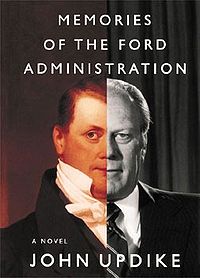- Memories of the Ford Administration
-
Memories of the Ford Administration 
First edition coverAuthor(s) John Updike Cover artist Chip Kidd Country United States Language English Genre(s) Philosophical, War Publisher Alfred A. Knopf Publication date 1992 Media type Print (Hardcover) and (audio-CD) Pages 369 pp ISBN 0-679-41681-1 OCLC Number 26055447 Dewey Decimal 813/.54 20 LC Classification PS3571.P4 M45 1992b Memories of the Ford Administration is a 1992 novel by John Updike published by Knopf.
Contents
Plot introduction
Set in the early 1990s, it concerns a historian and teacher, Alfred Clayton, and his response to a national survey requesting "memories and impressions" of the administration of Gerald Ford. The novel is presented as Clayton's improbably long and incredibly personal response, submitted to his professional association, the Northern New England Association of American Historians (NNEAAH). (Clayton teaches at a junior college in New Hampshire.)
Major themes
Clayton idealizes the Ford years and the sexual freedom they represented, and the novel cuts between his memories of the 1970s and scenes from his uncompleted biography of James Buchanan, which he was writing at the time. Although Buchanan's life and times are discussed in great detail, to the point where Clayton (and Updike) crosses over into the realm of imagined thoughts and dialogue, there is next to nothing said about Ford or his administration in the novel. Rather, the Ford-era part of Clayton's memories center almost entirely on the professor's personal life, above all his romantic involvement with the wife of an English teacher on campus. Sexual encounters are described in loving detail, leaving the reader to think that Clayton must be off his rails to be enumerating such dalliances before members of the NNEAAH. And he is off his rails in another way, too, namely, in being unable to constrain himself in writing about Buchanan, someone generally thought to have been rather a dud as a person and a president. Yet Clayton believes that Buchanan was largely wrongly blamed for bringing about the American Civil War through his weak leadership, and the historian questions how correct the general perception of Buchanan's character as related by most historians actually is.
The novel is a tour de force in the genre of mixed history and fiction, or rather in the writerly craft of stretching historical description to (and beyond) its accepted limits. No one seems to know more about Buchanan than Clayton/Updike, and this apparently is one reason why Clayton never could finish his Buchanan biography: he simply could not imagine his subject in any but the most intimate of terms. Writing a standard biography would have been too objectifying an act. He needs the prompt of "memories and impressions" concerning another president to get him going.
Clayton also notes the way that sexual mores had changed during his lifetime, recalling that while in the 1970s it was considered common for teachers at colleges to engage in sexual liaisons with their female students, by the 1990s this was deemed to be totally unacceptable and even criminal behavior. He vaguely laments the loss, although now back with his wife in the era of Ronald Reagan and George H. W. Bush, and comes across as a chastened man.
Evaluation
Memories of the Ford Administration is an unusual book, from the schizophrenic cover image depicting a combined Ford-Buchanan presidential portrait, to the compromised positions that Clayton finds himself in as a result of his unbridled devotion to sexuality in general and to his lover in particular. Running through it all is the arguably dull and overwritten biography of James Buchanan. Often the two stories do not conjoin, and the reader has the impression of skipping back and forth between two separate and unrelated books. If the premise that we are reading an extended response to a request by the NNEAAH for reflections on the Ford administration/era wears thin at times, it arguably serves to remind the reader that the work is a novel and that behind it sits a novelist.
External links
Select works of John Updike Rabbit Novels Rabbit, Run (1960) • Rabbit Redux (1971) • Rabbit Is Rich (1981) • Rabbit at Rest (1990) • Rabbit Remembered (2001)Bech books Buchanan books Buchanan Dying (1974) • Memories of the Ford Administration (1992)Eastwick books The Witches of Eastwick (1984) • The Widows of Eastwick (2008)The Scarlet Letter trilogy A Month of Sundays (1975) • Roger's Version (1986) • S. (1988)Other novels The Poorhouse Fair (1959) • The Centaur (1963) • Of the Farm (1965) • Couples (1968) • Marry Me: A Romance (1976) • The Coup (1978) •Brazil (1994) • In the Beauty of the Lilies (1996) • Toward the End of Time (1997) • Gertrude and Claudius (2000) • Seek My Face (2002) • Villages (2004) • Terrorist (2006)Short story collections The Same Door (1959) • Pigeon Feathers (1962) • Olinger Stories (1964) • The Music School (1966) • Museums and Women (1972) • Too Far to Go (1979) • Problems (1979) • Trust Me (1984) • The Afterlife (1994) • Licks of Love (2000) • The Early Stories (2003) • My Father's Tears (2009)Poetry collections The Carpentered Hen (1958) • Telephone Poles (1963) • Midpoint (1969) • Tossing and Turning (1977) • Facing Nature (1985) • Collected Poems (1993) • Americana (2001) • Endpoint (2009)Adaptations Rabbit Run • The Witches of Eastwick • EastwickCategories:- 1992 novels
- American novels
- Novels by John Updike
- Alfred A. Knopf books
Wikimedia Foundation. 2010.
